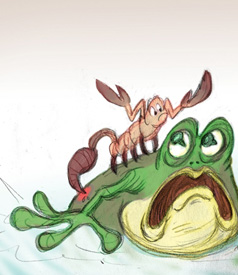
The Scorpion Syndrome
Favilla - Les Echos
The attorney general for the state of New York has just made an assessment of Wall Street's incorrigible obsession with bonuses, which has resumed like a wildfire. Once again, it inflames the cupidity of actors and begins to fan the anger of American public opinion, which is something new in this country traditionally hardcore in its adherence to the market. The public has good reason to be angry: together, nine big banks paid out some $33 billion in bonuses for 2008, while they recorded over $80 billion of losses and raked in over $175 billion of taxpayer assistance. Official good resolutions had no impact on their behavior. No one will change them.

Applying the ancient fable of the scorpion and the frog to contemporary banks' behavior, the authors writing as Favilla opine: "There would be a great deal to retain from this little story, were it not that, in finance, there are no morals." (Image: Zoe Piel/ www.zoepiel.com)
It's like the scorpion in the well-known fable. One day, the scorpion - who knows how to sting, but not how to swim - asks a frog to take him on his back to cross a river. Naturally reticent, given the scorpion's bad reputation, the frog allows himself to be convinced since it's obviously in the scorpion's interest to escape drowning. Nonetheless, the scorpion stings the frog in the middle of the river. And in final response to the ultimate question of the dying frog, the scorpion answers that it's in his nature to sting. Thus, their joint death signifies the fatal conjunction of trust and instinct. There would be a great deal to retain from this little story, were it not that, in finance, there are no morals.
In the eddies of the recent crisis, we have seen many frogs die: savers, investors, the taxpayers' public money, and, more generally, various actors in the real economy: but overall, very few scorpions. The frogs are partly responsible for this, since, seized themselves by the syndrome of the killer-insect, they haven't known how to master the instinct (greed) that pushes people to exploit the system with no consideration of the consequences. As for the new scorpion, the eagerness of the crowd of frogs will have allowed him to cross the ford on a sort of bridge of batrachians that he killed one after the other until he arrived on the opposite shore. Warped arthropod, he didn't even make the scorpion's signal gesture of honor by committing suicide when he was surrounded by fire. If the Wall Street fable, unlike the other, contains neither moral nor honor, it undoubtedly must be because the laws of finance are not the laws of nature.
